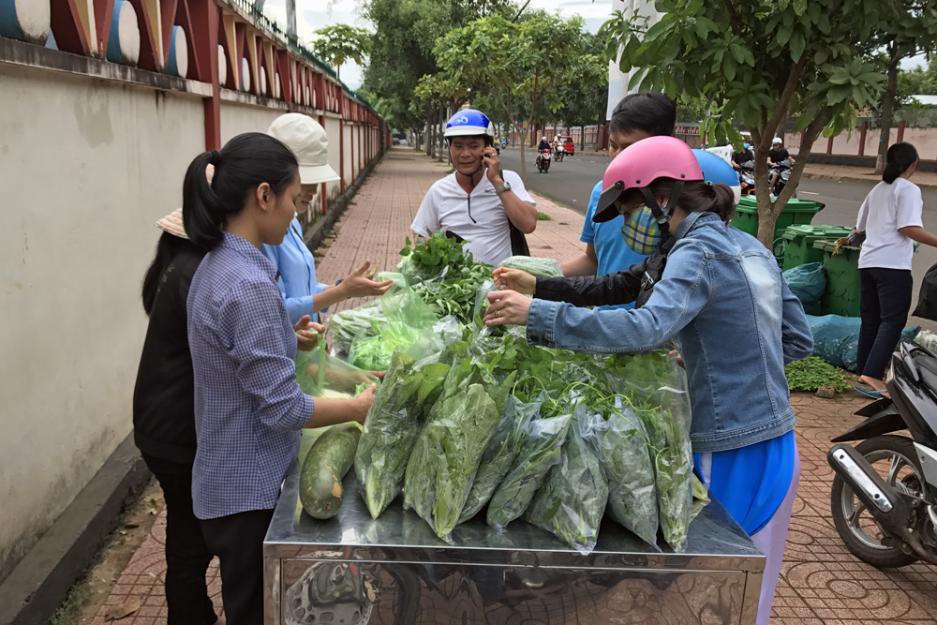Many people have little connection to the process of raising food and getting it to our tables. This disconnect is common and can be dangerous. The impact of certain agricultural practices, including the use of chemicals to fertilize plants or kill weeds and insects, can have deadly effects on humans and nature alike.
The use of chemicals to boost agricultural yields and speed production is common, but it's not the only way to grow. More consumers are eager for food that is healthier for them and the environment. Sisters in Vietnam are modeling organic practices and leading the way for more farmers to produce more and better food.
Consumers generally favor food that’s fast and inexpensive, rather than trying to find the time, land, tools and skills to grow their own. With fewer people engaged in the work of feeding an ever-growing population, shortcuts and compromises seem inevitable. Taking time to think more about food could lead to simple but significant changes in our choices.
Introduce this activity by saying: Tomatoes find their way into many things that we eat, including salads and salsa, pizza and pasta, and, of course, ketchup (or catsup). You might be unsure whether it’s pronounced to-MAY-toe or to-MAH-toe, or if it’s a fruit or a vegetable. Let’s learn more about how they’re grown with this quick quiz:
- Successful tomato growers make extra money by selling bouquets made with bright yellow flowers found on their plants. True or false?
- The tomato hornworm is a cute bug that protects tomato leaves from being eaten up by hungry wasps. True or false?
- Most of the tomatoes we buy in stores are picked when they’re green and sprayed with a gas that turns them red. True or false?
Answers:
- False. Those flowers are what becomes the tomatoes, so picking them would not make a grower successful.
- False. Hornworms devour tomato plants. Wasps can kill hornworms by laying eggs in their bodies. As wasp larvae develop, they eat the hornworms alive.
- True. Tomatoes picked ripe often will rot before they get to market weeks later. The gas they are sprayed with is actually a gas that tomato plants emit naturally.
For more background on each of these questions, visit these sites:
- Flowers: https://homeguides.sfgate.com/yellow-flowers-tomato-plants-turn-tomatoes-64200.html
- Hornworms: https://www.almanac.com/pest/tomato-hornworms
- Gas ripening: https://www.davidsonfarmersmarket.org/painted-tomatoes-ethaline-gas-speeds-ripening/
Encourage your students to try growing their own produce. Even if they don’t have access to a lot of land, they might create a container garden on a porch at home or a small community gardening plot somewhere on your school grounds.
Begin by saying:
"While tomatoes are a regular part of most people's diets, very few people raise their own. That's because growing food can be hard work. Just like learning to play a sport or a musical instrument, agriculture is something that requires a lot of knowledge, practice and patience. Think of an activity that you enjoy doing."
Then ask:
- Did you learn to do this activity entirely on your own, or did somebody or something – like a video or book – teach you certain skills.
- What is more satisfying? To watch someone do an activity (score points in a sport or perform a song) or do it yourself?
- When you’ve learned a new skill, do you feel obligated to share it with others? Do you enjoy teaching people about things you enjoy?
Summarize by sharing:
"Sisters in Vietnam share their knowledge of how things grow with local people, giving them opportunities to raise their own healthy food and sell produce, pork and poultry."
Blessed are you, Lord God of all creation,
for through your goodness we have received so many great gifts.
We praise you for soil and seed, for sun and rain showers.
We thank you for tomatoes and every good food that helps us grow.
Inspire those who grow our food to sow their wisdom in others
who might also feed your people.
Amen.
Please give us your feedback! Fill out a quick survey about this lesson and how we can serve you better. Remember that its title is "Sisters promote organic farming in Vietnam"
Tell us what you think about this resource, or give us ideas for other resources you'd like to see, by contacting us at education@globalsistersreport.org
